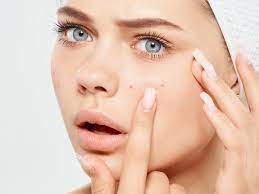Introduction to Adult Acne
For Acne Treatments, Adult acne refers to the occurrence of acne breakouts in individuals over the age of 25. It can manifest in various forms, including whiteheads, blackheads, pimples, and cysts. Unlike teenage acne, adult acne may have different underlying causes and requires a tailored approach to treatment.
Causes of Adult Acne
Hormonal Changes
Fluctuations in hormone levels, such as those experienced during menstruation, pregnancy, or menopause, can contribute to adult acne. Hormonal imbalances can lead to increased sebum production and clogged pores, resulting in acne breakouts.
Genetics and Family History
A family history of acne can predispose individuals to develop adult acne. Genetic factors play a role in determining skin type, oil production, and susceptibility to acne-causing bacteria.
Stress and Lifestyle Factors
High levels of stress can trigger hormonal changes and inflammation, leading to acne flare-ups. Unhealthy lifestyle habits like poor diet, lack of exercise, and inadequate skincare routines can also contribute to adult acne.
Understanding Different Types of Acne
Acne can present in various forms, each requiring specific treatment approaches:
Whiteheads and Blackheads
These are non-inflammatory types of acne characterized by clogged pores. Whiteheads remain closed at the surface, while blackheads are open and exposed to air, causing the dark appearance.
Papules and Pustules
Papules are small, red bumps without a visible opening, while pustules contain pus and appear as white or yellowish bumps on the skin.
Cysts and Nodules
These are severe forms of acne that involve deep, painful nodules or cysts beneath the skin. They can cause scarring and require professional treatment.
Factors Influencing Adult Acne
Diet and Nutrition
Certain foods high in sugar, dairy, and processed ingredients can exacerbate acne. A balanced diet rich in fruits, vegetables, and whole grains can promote clearer skin.
Skincare Products and Makeup
Using comedogenic or pore-clogging skincare products and makeup can contribute to acne. Choosing non-comedogenic, oil-free products is essential for acne-prone skin.
Environmental Factors
Exposure to pollutants, humidity, and harsh chemicals can irritate the skin and worsen acne. Protecting the skin with sunscreen and avoiding environmental triggers can help.
Effective Treatments for Adult Acne
Topical Treatments
Over-the-counter and prescription topical treatments containing ingredients like benzoyl peroxide, salicylic acid, and retinoids can help unclog pores and reduce acne.
Oral Medications
Oral medications such as antibiotics, hormonal therapies, and isotretinoin may be prescribed for moderate to severe acne that doesn't respond to topical treatments.
Professional Procedures
Dermatological procedures like chemical peels, microdermabrasion, laser therapy, and extraction of comedones can be effective in treating acne and improving skin texture.
Lifestyle Changes to Improve Acne
Stress Management Techniques
Practicing relaxation techniques such as meditation, yoga, and deep breathing can help reduce stress levels and minimize acne breakouts.
Diet and Nutrition Adjustments
Incorporating anti-inflammatory foods, staying hydrated, and avoiding trigger foods can support overall skin health and reduce acne inflammation.
Skincare Routine Tips
Establishing a consistent skincare routine with gentle cleansers, non-comedogenic moisturizers, and acne-fighting treatments can promote clearer skin.
Preventative Measures for Adult Acne
Regular Cleansing and Exfoliation
Daily cleansing and gentle exfoliation can help remove excess oil, dirt, and dead skin cells that contribute to acne formation.
Use of Non-comedogenic Products
Choosing skincare and makeup products labeled as non-comedogenic ensures they won't clog pores or aggravate acne-prone skin.
Avoiding Triggering Factors
Identifying and avoiding triggers such as certain foods, stressors, and environmental pollutants can help prevent acne flare-ups.
Addressing Acne Scarring
Treatment Options for Acne Scars
Options like microneedling, laser resurfacing, chemical peels, and dermal fillers can help reduce the appearance of acne scars and improve skin texture.
Prevention of Scarring
Early intervention and effective acne management can minimize the risk of developing severe acne scars.
Conclusion
For Acne Treatments in Riyadh Understanding the causes of adult acne and implementing appropriate treatment and prevention strategies are key to managing this common skin condition. With the right approach, individuals can achieve clearer, healthier skin and boost their confidence.






Comments